State councillor (China)
The state councillor (simplified Chinese: 国务委员; traditional Chinese: 國務委員; pinyin: guówù wěiyuán; lit.: 'Councillor for National Affairs') is a high-ranking position within the State Council of the People's Republic of China, the executive organ of China's central government (comparable to a cabinet). It ranks immediately below the Vice Premiers and above the Ministers of various departments.[1] The position was created during the May 1982 restructuring of the State Council, when eleven state councillors were appointed, ten of whom were vice premiers until then.[2]
Role
In theory, state councillors are to assist the Premier and Vice-Premiers to oversee various government portfolios. They can also represent the State Council (and in turn, China's government) on foreign visits. state councillors are part of a Standing Committee of the State Council, alongside the Premier, Vice-Premiers, and the Secretary General of the State Council. The organ holds weekly meetings. In practice, a state councillor's portfolios can be very wide-ranging. State councillors often accompany China's higher dignitaries on trips abroad - as was the case with State Councillor Tang Jiaxuan from 2003–08, and Dai Bingguo from 2008–present. Dai also became China's representative at the 2009 G8 summit in Italy when President Hu Jintao decided to cut short his attendance to return to China in order to deal with the July 2009 Ürümqi riots.
List of state councillors
- 5th State Council (1982–1983)
The position was created during the May 1982 restructuring of the State Council. Eleven state councillors were appointed, ten of whom were vice premiers until then, the only exception being Zhang Jingfu.[2]
- Yu Qiuli
- Geng Biao
- Fang Yi
- Gu Mu
- Kang Shi'en
- Chen Muhua
- Bo Yibo
- Ji Pengfei
- Huang Hua
- Zhang Jingfu
- Zhang Aiping
- 6th State Council (1983–1988)
- Fang Yi
- Gu Mu
- Kang Shi'en
- Chen Muhua
- Ji Pengfei
- Zhang Jingfu
- Zhang Aiping
- Wu Xueqian
- Wang Bingqian
- Song Ping
- Song Jian
- 7th State Council (1988–1993)
- Li Tieying
- Qin Jiwei
- Wang Bingqian
- Song Jian
- Wang Fang
- Zou Jiahua
- Li Guixian
- Chen Xitong
- Chen Junsheng
- Qian Qichen
- 8th State Council (1993–1998)
- Li Tieying
- Chi Haotian
- Song Jian
- Li Guixian
- Chen Junsheng
- Ismail Amat
- Peng Peiyun
- Luo Gan - Secretary-General of the State Council
- 9th State Council (1998–2003)
- Chi Haotian
- Luo Gan
- Ismail Amat
- Wu Yi
- Wang Zhongyu - Secretary-General of the State Council
- 10th State Council (2003–2008)
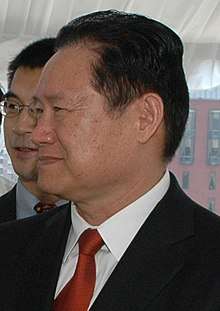 |
 |
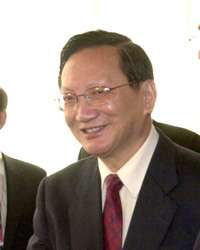 |
 |
 |
| Zhou Yongkang | Cao Gangchuan | Tang Jiaxuan | Hua Jianmin | Chen Zhili |
|---|---|---|---|---|
| Minister of Public Security | Minister of National Defence | foreign affairs | Secretary General of the State Council |
education, sci-tech, culture, health, sport |
- 11th State Council (2008–2013)
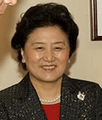 |
 |
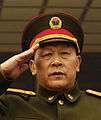 |
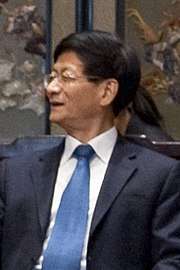 |
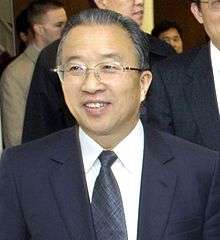 |
| Liu Yandong | Ma Kai | Liang Guanglie | Meng Jianzhu | Dai Bingguo |
|---|---|---|---|---|
| education, sci-tech, culture, sport |
Secretary General of the State Council |
Minister of National Defence | Minister of Public Security | foreign affairs |
- 12th State Council (2013–2018)
 |
 |
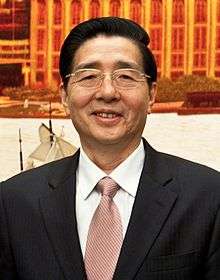 |
 | |
| Yang Jing (removed from office 24 February 2018) |
Chang Wanquan | Yang Jiechi | Guo Shengkun | Wang Yong |
|---|---|---|---|---|
| Secretary General of the State Council |
Minister of National Defence | Foreign affairs | Minister of Public Security | Disaster response, etc. |
- 13th State Council (2018–2023)
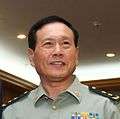 |
 |
_(cropped).jpg) |
.jpg) |
.jpg) |
| Wei Fenghe | Wang Yong | Wang Yi | Xiao Jie | Zhao Kezhi |
|---|---|---|---|---|
| Minister of National Defence | Disaster response, etc. | Minister of Foreign Affairs | Secretary General of the State Council |
Minister of Public Security |
References
- Laws on the composition of the State Council
- Li, Jinshan (16 December 1998). Bureaucratic Restructure in Reforming China: A Redistribution of Political Power. World Scientific. p. 17. ISBN 978-981-4495-43-1.
- NPC endorses new cabinet lineup
.svg.png)
.jpg)
_01.jpg)